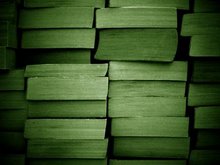Now that it's July, I'm over halfway through
this little project. Thinking back on what I've been able to accomplish and what I've learned so far, it strikes me that there haven't been any major surprises.
By far the biggest challenge has been effectively
balancing my writing time with my work time and, more to the point, conserving enough energy to be able to focus on writing. I thought that
writing in the morning, before starting work, would mitigate this challenge. While that schedule has certainly made things easier, I underestimated how difficult it would be to clear my mind of each day's commitments during those morning hours.
I also realize that I was far too optimistic about my prospects for getting my poems published. When I set my
goals for the year, I (naively) imagined that I could get into six journals. Having received my fair share of rejection letters before, I should have known better. I've received some encouraging feedback (well,
as encouraging as a rejection letter can be), but so far, no dice. I'm tempted to say, a la Rilke, Donald Hall, and many other, wiser writers, that I should not have focused on publication at all, and instead turned inward and used this year to build up a solid collection. But the fact is that my goals for sending poems out have been a significant motivator for me at times when I felt most dispirited; at least then I felt like I was doing something, not just sitting by myself, scribbling away.
Along the same lines, having
a group of readers to respond to my work has been essential. They give me an audience--however small--and have consistently illuminated facets of my poems that I had not noticed or fully explored. That's not to say that all of them have been reliable or fast in their responses, but I didn't expect them to be. After all, they're busy people. It has been hard enough for me to find enough energy for this work, and I've carved out at least 20 hours a week to do it.
Looking ahead to the remaining six months, I'd like to be better about not only drafting poems, but completing them. So far I've given myself a lot of room to explore and make mistakes. In my daily writing I feel free to create spectacular poetic wrecks and half-formed freaks of nature. That's fine, but as time begins to become more of an issue, I need to rededicate myself to not just starting, but finishing poems. It sounds obvious, but it requires patience and determination.
Relatedly, I have to start more consciously exploring connections between the poems I'm working on and begin thinking of ways to gather them into a coherent manuscript. I want to emerge from AWY with some kind of collection, even if it is imperfect. That will take work and planning. By November I hope to be well into the process of culling and editing the poems that will be included, which means I only have a little over three months to build up a stockpile of material. Jeezus.
More focus, more finished poems, and more work towards a manuscript. Sounds about right. I'll keep you posted on how it goes.
 It's been a while since I've raved about a particular book, but Tony Hoagland's essay collection Real Sofistikashun deserves a few cheers. In it he does an exceptionally good job representing a centrist perspective on poetry, keenly assessing contemporary trends while modestly advocating for poems that resonate with human experience. His essay "Fear of Narrative and the Skittery Poem of Our Moment" contains one of the most insightful and balanced explanations for the tendency of contemporary poets to reject meaning and narrative that I've read yet -- as well as a persuasive argument for poets to be cautious in following that impulse:
It's been a while since I've raved about a particular book, but Tony Hoagland's essay collection Real Sofistikashun deserves a few cheers. In it he does an exceptionally good job representing a centrist perspective on poetry, keenly assessing contemporary trends while modestly advocating for poems that resonate with human experience. His essay "Fear of Narrative and the Skittery Poem of Our Moment" contains one of the most insightful and balanced explanations for the tendency of contemporary poets to reject meaning and narrative that I've read yet -- as well as a persuasive argument for poets to be cautious in following that impulse:

